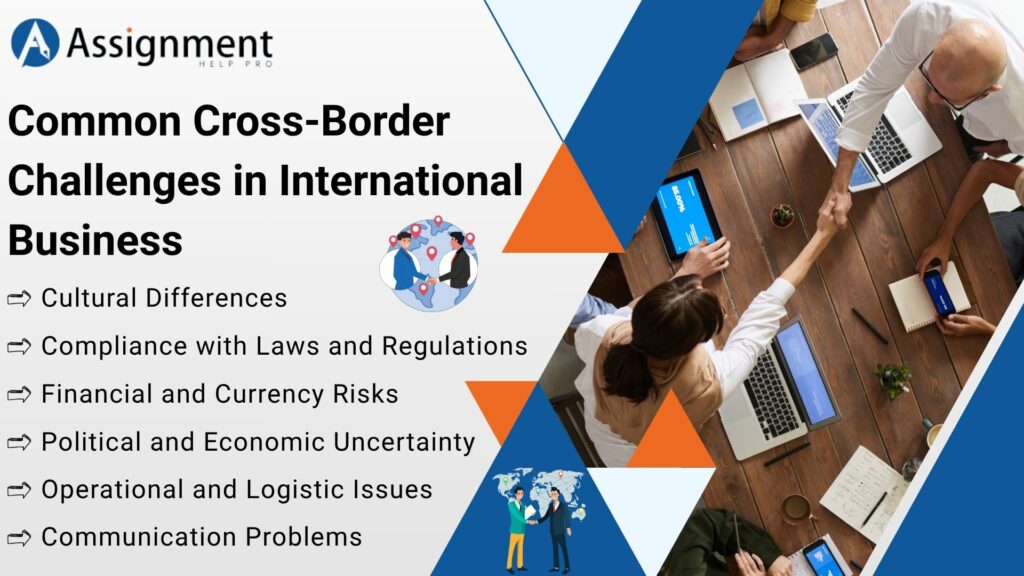Some of the most common challenges that international businesses face include cultural differences and legal and financial risks, among many others. If a business wants to succeed globally, then it must know how to overcome these cross-border challenges. Most importantly, by implementing certain practical strategies, businesses can strengthen their international relationships and achieve long-term growth.
Businesses are no longer confined to their home country in today’s global world. Many companies go internationally to explore new markets, search for talented employees, and get a competitive advantage. However, going global possesses challenges as well. For cross-border business to be successful, you need careful planning along with an explicit understanding of the cultural, legal, and economic differences. If you are a student or professional working on international business projects, knowing these challenges is very important. If you lack knowledge on this subject or struggle to write your international business assignment on this topic, read this blog. We have discussed herein the cross-border challenges in international business and the ways to overcome them.
Common Cross-Border Challenges in International Business
When a company expands into overseas markets, it is usually confronted with challenges that do not seem to exist within the nation of its origin. These challenges can be cultural, legal, operational, financial, or even political. If you want business success worldwide, then for creating effective strategies, it is very crucial to know about these common cross-border trade obstacles.
1. Cultural Differences
Culture is an essential issue in international business. Communication, work habits, negotiation styles, and customer behavior are very different in every country. If the business does not understand these differences, problems such as failed partnerships, poor management, or even financial losses may arise. For example, a marketing strategy that is effective for one country may fail in another because people’s preferences and values differ from place to place.
Solution
Businesses should provide cultural training to both their employees and management. Cross-cultural workshops, local mentors, and hiring teams that understand different cultures will help close gaps. Accepting diversity and inclusion not only prevents misunderstanding but also increases creativity and innovation.
2. Compliance with Laws and Regulations
Every country differs in laws, rules, and ways of doing business. Therefore, dealing with these legal differences becomes one of the most challenging parts of international business. For instance, failure to comply with everything from tax and employment rules to import/export laws to the protection of intellectual property rights can lead to heavy fines or legal problems. Companies, therefore, need to pay close attention to the local regulations before expanding abroad.
Solution
Companies should also ensure that all legal requirements are scrutinized before a new market entry. By consulting with local legal professionals and monitoring regulatory changes, a firm can ensure that its operations do not violate any law. Also, establishing a legal risk management scheme would help in the early detection and control of potential issues before they become critical.
3. Financial and Currency Risks
Changes in exchange rates, financial reporting regulations, and differential international taxes can also contribute to financial uncertainty. For example, businesses might unexpectedly lose money if currency values fluctuate sharply or if certain financial transactions are not carried out properly.
Solution
You can safeguard your business against currency changes with careful financial planning and strategies like hedging. Moreover, you may approach local accountants who understand international accounting rules or business assignment help experts for a better understanding of international financial issues.
4. Political and Economic Uncertainty
Political unrest, changes in government rules, and economic instability may drastically affect international business. Some other common issues faced by companies in an unstable region are the limits to trade, tariffs, and sanctions.
Solution
Companies need to assess political risk before expanding abroad. Potential problems can be mitigated by diversifying investments and having contingency plans. Staying abreast of changes in political winds and having close relations with local partners make operations more resilient and secure.
5. Operational and Logistic Issues
Supply chain management of a global company requires coordinating activities across many countries. In addition, the differences in infrastructure, transport systems, and time zones can cause delays, increased costs, and a lack of efficiency.
Solution
Businesses should, therefore, use technology to advance the ease of operation. For instance, the use of supply chain software, real-time tracking, and analysis could further improve logistics. This is if they work with local partners who understand the region to reduce operating challenges.
6. Communication Problems
Linguistic and communication style differences create barriers for international business teams to collaborate with each other. Additionally, misunderstandings lead to delays in projects, low productivity, and conflict.
Solution
It is also important to encourage multilingualism and establish clear-cut communication guidelines. The use of video conferencing, instant chats, and collaboration tools will help bring the teams closer. Intercultural communication training among employees improves understanding and cooperation among them.
Strategies for Overcoming Cross-Border Challenges
Early planning and strategizing will be required for international businesses to successfully meet these challenges. The following are some important strategies that international businesses need to follow to overcome the challenges in cross-border trade
- Conduct proper market research to understand customer behavior, demand in the market, and competitors. This should also include studying cultural and legal environments to avoid mistakes in its commission.
- Build alliances with local businesses, suppliers, or consultants. Such connections improve your knowledge of the market, enhance your credibility, and facilitate easier operation of your business.
- Adapt business models to suit local needs. Firms are called to adjust their product, service, or marketing strategies to suit local preferences, rules, and economic conditions.
- Invest in enhancing the competencies and cultural awareness of your teams. Training employees in cross-cultural skills, legal regulations, and financial management facilitates smooth operations.
- Pinpoint the possible risks, such as political, financial, and operational problems, and make backup plans. Diversification of investments and supply chains adds protection.
- Utilize technology to enhance communication and operational efficiency. In the modern world, project management systems, supply chain systems, and data analytics contribute to reducing delays and increasing efficiency.
- Keep learning and adapting continuously. International business has changed fast, and companies that keep flexible and innovate are in a better place.
Wrapping Up
Challenges are part of doing business across borders; however, they can be managed. Be it a student dealing with international business assignments or a professional operating in real markets, careful planning, risk management, and continuous learning hold the key. If you have no idea about how to handle the challenges in cross-border trade, then avail yourself of the services of our international business assignment help. The subject experts in our team will not only offer you customized assignment help on international business topics but also guide you in suggesting strategies that lead to the global success of your company.
FAQs
1. What are the main cultural challenges that occur in international business?
Cultural challenges include the way people communicate, negotiate, work, and behave as consumers. Learning to understand and respect these differences is important for building good international business relationships.
2. How can businesses manage legal and regulatory risks abroad?
Legal risks can be managed by a business through engaging the services of local legal experts, careful rule checks before acting, monitoring changes in regulations, and putting in place mechanisms for managing potential legal issues.
3. What are strategies that will help reduce financial risks in cross-border operations?
Businesses could protect against financial risks through hedging currencies, recruiting local accountants who understand international rules, and adhering to strong financial planning in order to handle changes in exchange rates and tax issues.
4. Why is communication a major challenge in global business, and what is the solution to it?
Different languages and ways of communication may cause misunderstandings. However, encouraging multilingual skills, establishing clear communication rules, and using video calls and teamwork platforms can solve this problem.





